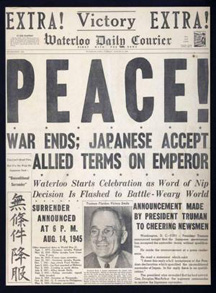Lessons of WWII Must Never Be Forgotten
Posted
by Pat Kinney
on Thursday, August 6, 2020
World War II ended 75 years ago this month with the dropping of atomic bombs on Hiroshima and Nagasaki Aug. 6 and 9 respectively, and the Japanese surrender Aug. 14. Nazi Germany had fallen and surrendered four months earlier. Japan officially signed surrender papers aboard the battleship USS Missouri, alongside its sister ship the USS Iowa, in Tokyo Bay Sept. 2, which was declared Victory over Japan day, or V-J Day.
The Waterloo Courier's Aug. 14, 1945 front page with the huge headline "PEACE" is so iconic it hangs at the Harry S. Truman Presidential Library and Museum in Independence, Mo.
While later generations see newsreel images of celebrations in the streets, it was more solemn occasion for millions who'd lost loved ones in the war, and the surrender at Tokyo Bay was conducted in a manner befitting that sacrifice.
I wrote this editorial for the Waterloo Courier in 2010 on the 70th anniversary of the war's end. With the Courier's kind permission, we're rerunning it here.
Lessons of World War II must never be forgotten.
Publication date: 8/9/2015 Page: 1
Byline: We must never forget what happened 70 years ago this month. The most terrible war in human history ended in a nuclear holocaust.
World War II, the most horrible conflict in human history waged against two of the most cruel totalitarian regimes in history -- Nazi Germany and Imperial Japan -- came to an end after six years of carnage.
More than 60 million people died in it, including 27 million Russians, 10 million Chinese and 6 million Jews. More than 400,000 Americans died -- the most since the Civil War -- along with millions from other nations.
World War II was the first nuclear war. The atomic bombings of Hiroshima on Aug. 6, 1945, and Nagasaki 70 years ago today resulted in 129,000 dead in those two cities, ultimately forcing the Japanese surrender.

Photos Captioned Left to Right:
- USS Iowa (right) next to USS Missouri 8-20-45 receiving sailors from Missouri to make room for Japanese surrender ceremony
- USS Iowa and USS Missouri (in front) entering Tokyo Bay
- USS Iowa's whale boat arriving with Japanese delegation to USS Missouri for ceremony.
It possibly saved a greater number lives than would have been lost in an invasion of Japan.
Late U.S. Navy Rear Adm. James D. Ramage of Waterloo, who served in the aircraft carrier USS Enterprise dive bomber squadron, told The Courier years ago "Golden Gate by '48" was a popular saying at the time. He described the potential additional carnage in stark terms.
"A hangar deck full of corpses is not a pretty sight," he said.
For others, like John Redl of Cedar Falls, Toby Thompson of Waterloo and Dale Minger of Wadena, the end of the war meant liberation after years of captivity, starvation and beatings at the hands of Japanese imperial troops. All were captured in 1942 at Corregidor in the Philippines and held as prisoners and slave laborers until the war's end.
While the two A-bombs may have saved lives, the utter destruction of those two Japanese cities showed the extent humankind had advanced in its own ability to destroy itself.
The Japanese surrender was announced in the U.S. on Aug. 14, 1945, according to the front page of that day's Waterloo Courier.

Courier Japanese surrender front page
The Japanese Empire formally signed surrender papers Sept. 2, 1945, aboard the battleship USS Missouri in Tokyo Bay. At that ceremony, Supreme Allied Commander Gen. Douglas MacArthur delivered a message that should be remembered across the ages.
"It is my earnest hope, and indeed the hope of all mankind, that from this solemn occasion a better world shall emerge out of the blood and carnage of the past -- a world founded upon faith and understanding, a world dedicated to the dignity of man and the fulfillment of his most cherished wish for freedom, tolerance and justice.
"A new era is upon us," MacArthur said in closing remarks. "Even the lesson of victory itself brings with it profound concern, both for our future security and the survival of civilization. The destructiveness of the war potential, through progressive advances in scientific discovery, has in fact now reached a point which revises the traditional concepts of war.
"We have had our last chance," MacArthur said. "If we do not now devise some greater and more equitable system, Armageddon will be at our door."
Seventy years later, Armageddon is still at our door. Terrible weapons of mass destruction still exist. It begs the question as to whether current and future generations have retained the lesson of 70 years ago -- or are doomed to repeat it.
"The problem basically is theological," MacArthur said "It must be of the spirit if we are to save the flesh."
Let us hope we indeed have the spirit to save ourselves.
It boils down to a concept repeated though many faiths and philosophies: Do unto others as you would have them do unto you.